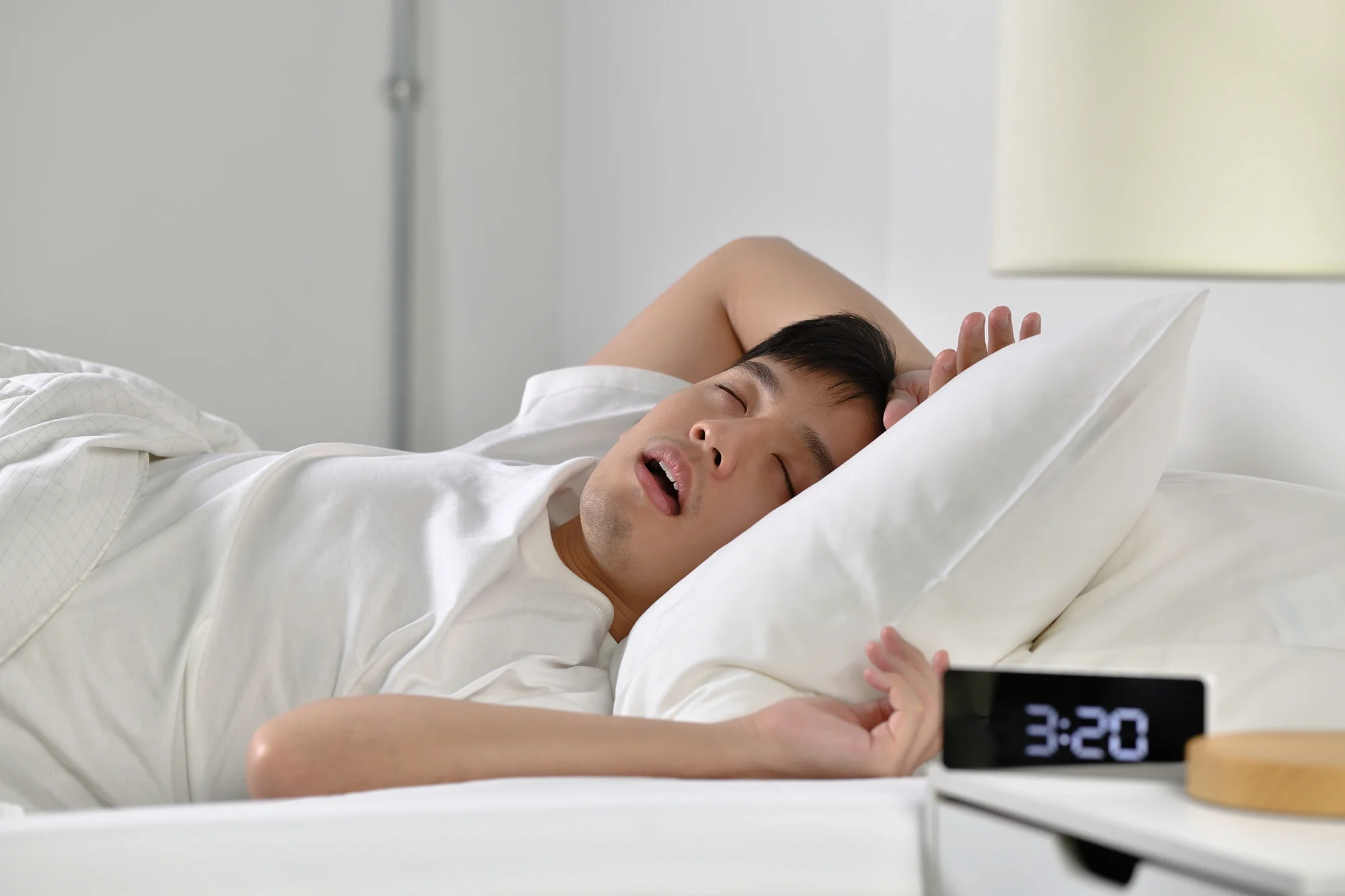How to Reduce Snoring: Effective Tips for Better Sleep
Snoring is not just a nighttime annoyance; it can affect the quality of sleep for you and your partner. Characterised by a hoarse or harsh sound during sleep, snoring occurs when airflow through the mouth and nose is partially obstructed. This blockage causes the tissues in the back of the throat to vibrate.
While occasional snoring is usually harmless, frequent or loud snoring could be a sign of an underlying condition like obstructive sleep apnoea (OSA). Addressing it early can help you sleep better and protect your long-term health.
Effective Tips to Reduce Snoring
Fortunately, individuals can find relief from snoring through simple remedies, from lifestyle adjustments to targeted techniques, which can help minimise airway obstructions.
Try these strategies to help you learn how to reduce snoring:
Change Your Sleep Position
The way you sleep can have a significant impact on snoring. Sleeping on your back (supine position) may cause the tongue and soft palate to rest against the back of the throat. This position can narrow the airway and cause a vibrating sound during sleep.
Switching to a side-sleeping position can help keep the airways open and facilitate smoother breathing. To maintain this position, you can place a body pillow behind you or use specialised positioners to keep you from rolling onto your back during the night. Additionally, raising the head of your bed by about 10–15 cm can help reduce snoring in some people by promoting better airflow.
Lose Weight
Excessive weight or obesity often contributes to snoring problems. When fat tissue accumulates around the neck, it can narrow the internal diameter of the throat and restrict air movement while you sleep.
To address this, you can adopt a well-balanced diet and incorporate regular exercise into your routine to shed excess weight. These lifestyle changes will not only help alleviate loud snoring but also improve overall health.
Avoid Alcohol Consumption
Alcohol can cause the soft tissues and muscles in the throat to relax and collapse the airway, triggering snoring symptoms. For instance, drinking alcohol, particularly close to bedtime, can worsen the frequency and intensity of snoring.
To help reduce snoring episodes, it is advisable to avoid alcohol consumption, particularly after 6pm. This allows the body to metabolise the alcohol and minimise its muscle-relaxing effects while you sleep.
Practice Good Sleep Hygiene
Having a good sleep routine is a healthy way to reduce snoring and ensure a restful night's sleep. Establish a regular sleep schedule, typically aiming for 7–9 hours per night, to regulate the body's internal clock and promote more consistent and restorative sleep patterns.
Another effective method of improving sleep hygiene is to create a sleep-friendly environment. Maintain a cool temperature, eliminate light sources, and minimise noise disturbances to promote restful sleep. Additionally, limit your exposure to electronic screens an hour before bedtime to help the body naturally prepare for sleep.
Stay Hydrated
Dehydration can contribute to thicker mucus in the throat and nasal passages, which may partially block airflow and promote snoring. Drinking enough water throughout the day helps keep these tissues hydrated. You can also eat water-rich foods like fruits and vegetables. While hydration alone won't eliminate snoring, it can support healthier airway function and reduce contributing factors.
Open Nasal Passages
Blocked or congested nasal passages can increase mouth breathing and lead to louder snoring. Saline sprays or nasal rinses can relieve congestion and remove irritants like allergens or dust. These approaches are most effective when snoring originates from nasal obstruction, not the throat.
When To See a Doctor
Many cases of snoring can be managed through lifestyle changes and home remedies, but some may warrant professional intervention. If the snoring is severe or recurrent, it may indicate sleep apnoea or other serious health issues.
Seek medical advice promptly when snoring is accompanied by concerning symptoms, such as:
Excessive Daytime Sleepiness: Despite sufficient sleep, feeling excessively tired during the day can be a sign of a sleep disorder.
Morning Headaches: Frequent headaches upon waking can indicate disrupted sleep, potentially due to snoring.
Breathing pauses during sleep: A bed partner noticing breathing pauses during sleep is a significant indicator of sleep apnoea.
Snoring is worsening over time or accompanied by weight gain or high blood pressure
Your smartwatch (Apple or Samsung) flags a moderate-to-severe risk of sleep apnea, based on sleep data collected over multiple nights.
(Both Apple Watch and Samsung Galaxy Watch (with Samsung Health Monitor) have FDA-cleared features that can screen for signs of obstructive sleep apnea. If your watch suggests elevated risk, it’s important to follow up with an ENT specialist for formal testing and diagnosis.)
With proper evaluation, doctors can determine the underlying cause of snoring and recommend an appropriate treatment. These can range from non-invasive devices such as continuous positive airway pressure (CPAP) machines, oral appliances to corrective airway surgery.
Breathe Easier, Sleep Better
Better sleep starts with identifying and addressing the cause of your snoring. Schedule a consultation with our experienced Singapore ENT specialist, Dr Valerie Tay, to discuss your symptoms and determine the appropriate treatment plan that helps you breathe well and sleep well.

